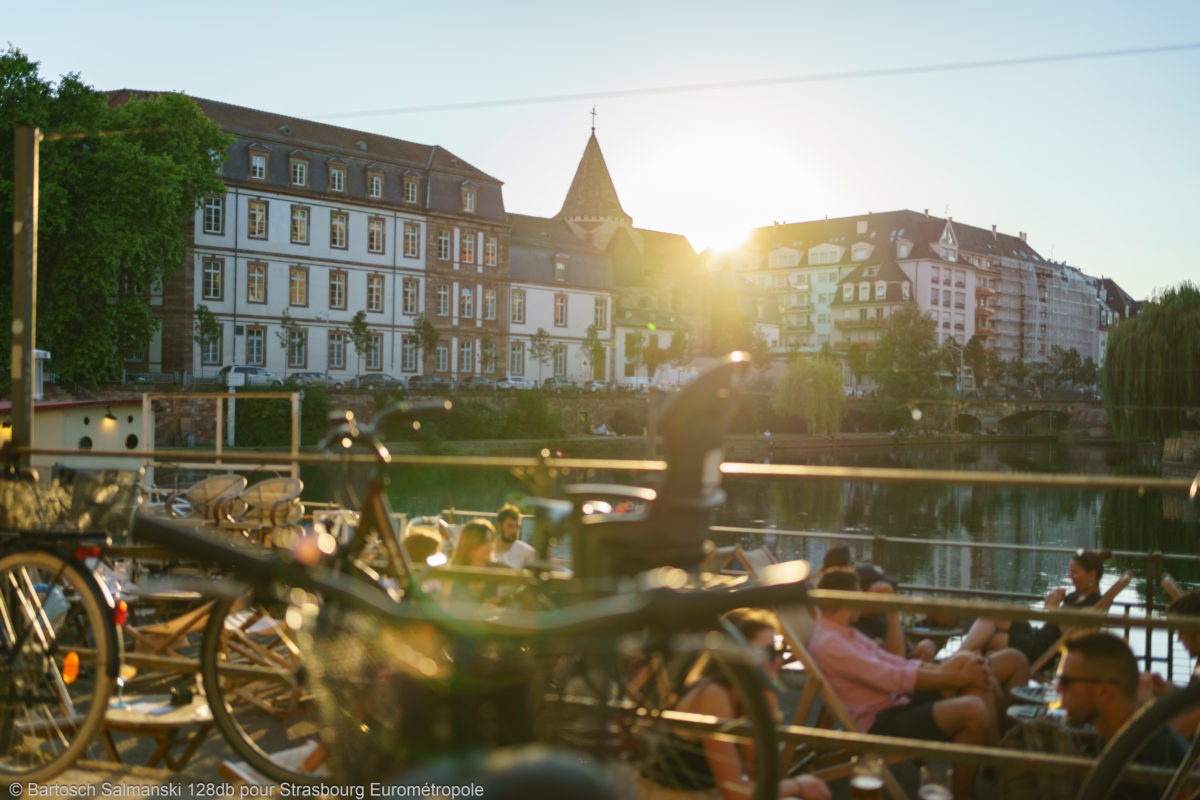Of the 60,000 people currently studying in Strasbourg in the city’s University or private organisations, some 20% are international students. Strasbourg is the leading university for excellence in France and was ranked number one in Europe in the Nature Index Innovation 2017. The University can boast 5 currently active Nobel prize winners, 35 faculties, institutes and schools, in sectors ranging from arts, letters, humanities, social sciences, languages and law to economics, business management, science, technologies and health.
The University of Strasbourg, one of the top-ranked universities worldwide
In 2015, the University of Strasbourg became the first French university to feature in the Shanghai rankings, widely considered to be the benchmark for university recognition. In 2020, the University of Strasbourg held onto its place among the 150 best universities worldwide, a considerable accolade for its chemistry and humanities faculties, which originally propelled the university into the rankings.
One of the great strengths of the University is its central location and its European values,which have enabled it to build up rewarding partnerships with the universities of Mulhouse, Basel, Freiburg and Karlsruhe.
The benefits of studying in Strasbourg
• The wide appeal of the courses the city offers – post-baccalaureate, degree courses for fulltime and part-time students, vocational training, work-study courses, double degree courses (Franco-German) and courses with international partner universities.
• A vibrant, fulfilling student life with comprehensive sports and cultural scenes. Strasbourg is ranked France’s most attractive city for students (L’Étudiant magazine, 2020).
• The University’s tree and grass-filled campus is just 10 minutes away from the city centre, and university president, Michel Deneken, talks of the “tarmac-free, borderless campus,” and emphasises the importance of bringing knowledge directly to citizens.
• Strasbourg is a university with many local, European and international cooperations. The EUCOR European campus comprises a partnership of 5 French, German and Swiss universities, while the University of Strasbourg has cooperation agreements with over 750 universities worldwide, especially in the United States and Japan.
• AlsaceTech is a cornerstone of vocational integration and is the umbrella organisation for 14 grandes écoles in engineering, architecture, art, design and management, including the Junior-entreprises strasbourgeoises organisation, which promotes the entrepreneurial qualities of many of the city’s students.
• The city is home to many internationally-renowned private- and public-sector schools, including the HEAR music-design and arts high school in Mulhouse and Strasbourg, whose former students include Marjane Satrapi, Blutch and Marion Fayolle, the Strasbourg School of architecture, EM Strasbourg Business School, INSA Strasbourg, the CUEJ School of journalism, ENA, MJM Graphic Design, LISAA, the Alexandrer Dumas catering school and the CEFPA European work/study centre for students in the hospitality industry.
The ISU (International Space University) set up in the Strasbourg’s Innovation Park in 2002, following an international competition for a host city. It offers a unique opportunity for its students seeking a career in the world space community.
Cutting-edge research
The University of Strasbourg is host to 72 research units and 2645 lecturers and academics. Inaddition to its faculties, the city can also boast a number of internationally ranked research institutes, including the Institute of Genetics and Molecular and Cellular Biology (IGBMC), which is one of the leading European centres in biomedical research and IRCAD, the Research Institute against Cancers of the Digestive System, the worldwide leader in training in minimally invasive surgery, which welcomes over 3500 surgeons every year to its courses.
Becoming a student entrepreneur
Strasbourg encourages and provides support for entrepreneuring students at several levels:
- Providing facilities and material
- Funding for collaborative initiatives
ETENA is part of the French PÉPITE network of student entrepreneurs and was set up to cater for students and young graduates seeking to launch entrepreneurial initiatives alongside their studies. ETENA sets out to encourage students’ entrepreneurial initiatives and to help them launch their own start-ups. Some 200 students every year benefit from ETENA support and about 10% of their projects result in the creation of a new company.
Finding student accommodation
Student accommodation in Strasbourg is a highly organised affair. The first stop is the CROUS Regional Centre for Student Affairs, which offers students a helping hand in finding grants and accommodation (it runs over a dozen halls of residence for students) and gives advice and tips on catering options. The University of Strasbourg has a dedicated office for welcoming students and helping them settle in. If you’re independent minded and want to find your own student accommodation, there are plenty websites offering rooms (usually between €400 and €550 per month, depending on the area), flat sharing (the https://www.lacartedescolocs.fr website for student accommodation listings was created in Strasbourg), rooms in private houses or in the MUI international student residence.
Strasbourg makes it easy to be a student
Strasbourg leaves no stone unturned to make sure the city’s students can immediately feel at home. The Strasbourg aime ses étudiants (Strasbourg loves its students) organisation puts on a series of events every autumn to help students find their feet and get to know the city.
The first thing most students get is the Pass Campus, a student card which also acts as a payment card, and which can be used for meals in the CROUS-run University restaurants and cafeterias, and also gives access to libraries and offers special rates for things such as printing and photocopies, public transport and sports facilities.
SUAPS is go-to place for the University’s sports facilities, and its website lists all the sports activities to be found both on the campus and in the city. The Carte Culture offers students discounts in many of the city’s cultural venues, such as the TNS and Maillon theatres, the opera, the Laiterie live music venue, and the city’s museums. Nightlife is, of course, a prominent feature of student life and there’s a huge choice of clubs, cafés, pubs and restaurants, which can be found on the local map of city nightlife https://strasmap.eu/Init. Boredom is not an option in Strasbourg! Are you ready to go?
Doing research in the library
Strasbourg’s National and University library (BNU) is the only one of its kind in higher education in France and in Europe. With a collection over 3 million volumes, it’s the second-largest library in France and an extraordinary heritage to explore, with its many priceless collections, which include manuscripts, papyrus documents, incunabula, numismatics and iconography.
The BNU is part of the French Ministry of Higher Education, Research and Innovation’s NoctamBU+ network for university libraries with broad opening times, where students can use its facilities in the evening, at weekends and during holiday periods.
Student life with a pronounced international flavour in Strasbourg
150 nationalities on the Strasbourg CampusSome
10,000 students from all over the world opt every year to come and do their studies in Strasbourg. The city offers a special welcome programme for international students, support documents for lectures and great campus life. The University of Strasbourg has been awarded the “Bienvenue en France” label, which guarantees a warm welcome for foreign students, and the city is the top-ranked French city with a large number of foreign students. One last thing –grants are available to help international mobility.
Abitur and Erasmus
Strasbourg is the capital of Europe and has a genuinely international outlook, sharing borders with both Germany and Switzerland. This open-mindedness applies also to education, and international schooling is available from kindergarten stage through to the baccalaureate, a wonderful stepping-stone for a European future.
Several secondary schools in Strasbourg offer the Abibac course, which delivers a double qualification with the German Abitur and the French baccalaureate, opening up excellent opportunities for studying in both German and French universities.
With tram connections over the Rhine, there’s no problem studying in France and doing a work placement in Germany.
Students with the urge to explore new lands can apply to the Erasmus programme, which offers the opportunity to work for at least a term in another European country. Fancy studying in Italy, Norway or Luxembourg? The hardest thing is actually choosing!






